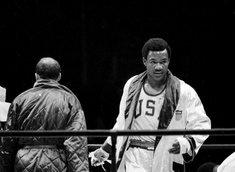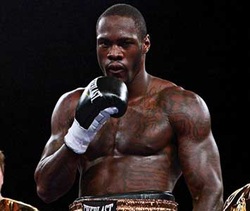 Foreman wins gold in Mexico in 1968
Foreman wins gold in Mexico in 1968 Recently I spoke about the structural change in the American Heavyweight boxing division and in particular its decline in recent decades. Below is an extension of this analysis.
The fall-off in American success is seismic when viewed in a historical context. By the mid 2000’s fighters from the former Soviet Bloc began to dominate the division. The current top 10 contenders for the heavyweight crown, according to The Ring Magazine, contains one American. Five are from former Soviet Bloc countries or Soviet satellite states.
So why has this happened?
Perhaps looking at the calibre of Heavyweight American amateur fighters coming through the ranks may provide some clues. Looking down through former American Olympic medallists who later held world champion status in the professional Heavyweight Division, the names of Floyd Patterson, Cassius Clay, Joe Frazier, George Foreman, Leon Spinks, Evander Holyfield, Riddick Bowe and Roy Jones Jr all appear. In the amateur ranks, Professional Heavyweight fighters traditionally come from the Light Heavyweight, Heavyweight and Super Heavyweight amateur categories. At the Olympics, the United States has not won a medal in the Light Heavyweight category since Athens
2004.
In the Heavyweight Division only 2 bronze medals have been won since Atlanta 1996. The last gold medal was in Seoul 1988. In the Super Heavyweight division the last medal was won in Seoul 1988, silver for Riddick Bowe. While this trend is indicative of the entire American Olympic boxing team, from casual observation performance at the Olympics appears to be a crude indicator of future professional success.
In Los Angeles 1984 for example, the American team won 9 gold medals. In London 2012 the Americans went with a team of 12 but only won 1 gold medal, 0 silver and 0 bronze. This gold medal was won by Clarissa Shields in the women’s Middleweight category.
Whilst maybe a crude predictor of future success, The Games prepares athletes at an elite level as they are fighting the best available opponents from other countries. The next major Heavyweight championship bout is the long overdue Wladimir Klitschko vs. Alexander Povetkin of Russia; both are former Olympic gold medallists.
Remarkably, the heavier boxing divisions in America have regressed to a relatively greater degree when compared to other weight divisions.The fall in success at the Olympics has not adversely affected American performance in the smaller professional weight divisions. Of the 4 main belts, WBC, WBA, IBF, WBO and including interim belts, Americans hold 41% of titles between Lightweight and Light-Heavyweight but 88% of the two heaviest divisions, Cruiserweight and Heavyweight are occupied by Europeans.
Except for the Heavyweight division, American boxing is in good health. This makes the fall in success of the Heavyweight Americans even more of an anomaly. Several explanatory reasons have been suggested to account for this including the already mentioned growth of European and, in particular, former Soviet/Communist states. Furthermore the fall in American success in the division has been attributed to a reduction in participation rates of young black Americans, traditionally from poorer socio-economic backgrounds.
An increase in educational opportunities perhaps, or an increase in the numbers going into other American sports such as American Football, Basketball and Baseball, all of which require athletes of large size and stature has further
hindered the enrolment rates of boxing. Many Heavyweight Americans come from a different sporting background and only turn to boxing when their ambitions are not met with their desired sport. Finally, reduced funding in a competitive American sports industry has been cited as a cause .
 Wilder - The American Hope?
Wilder - The American Hope? Heavyweight boxing has always had its apocalyptic predictions. The 1920’s world champion Gene Tunney lamented boxing’s demise when Cassius Clay and Sonny Liston locked horns in 1964. Bob Arum described the Heavyweight landscape as “waiting for the old fat bums to disappear” in 1985 just before Mike Tyson ripped through the division bringing a dangerous, compelling edge to the weight class. Despite the dark days, there is hope for American Heavyweights.
Deontay Wilder has just overcome his most difficult opponent to date, Sergei Liakhovich, to take his record to 29-O with all victories coming by way of Knockout or Technical Knockout and is an exciting American Heavyweight prospect.
For now the Heavyweight division has its home in the stadiums of Poland, Germany and Russia. Madison Square Garden and Las Vegas may have to wait a while longer for the return of a title once revered as the greatest crowning glory in all of sports; Heavyweight Champion of the World.
 RSS Feed
RSS Feed